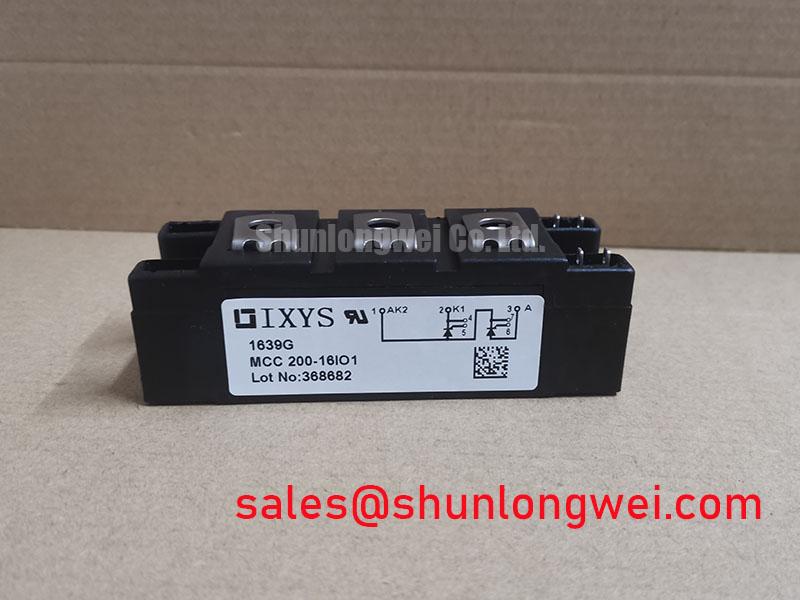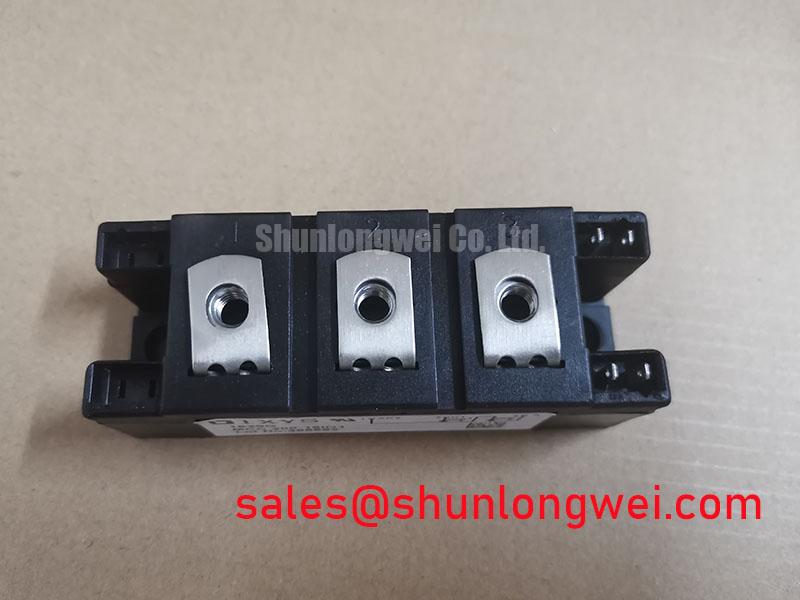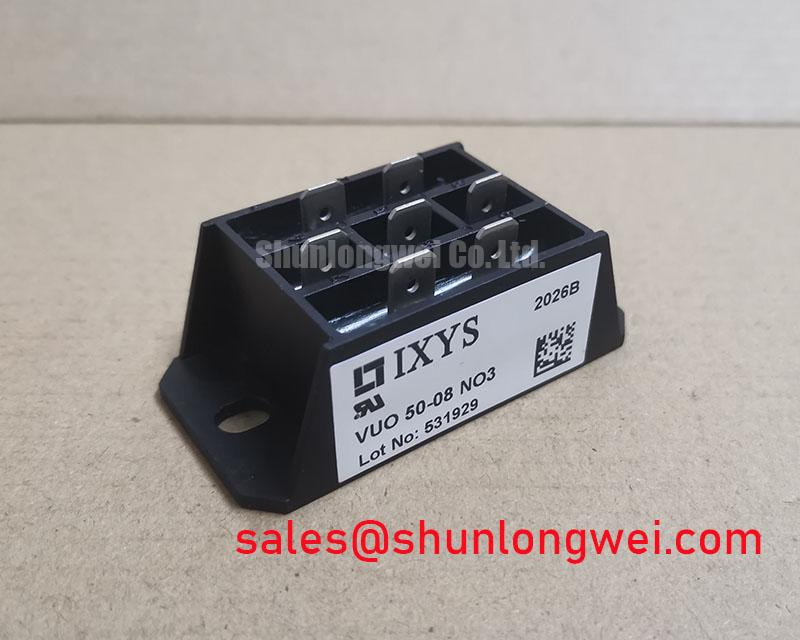Content last revised on November 19, 2025
MCC 200-16IO1 Thyristor Module: 1600V, 226A Power Control for Industrial Drives
Product Overview
Delivering High-Reliability Power Control for Demanding Industrial Systems
The MCC 200-16IO1 is a robust 1600V thyristor module engineered to deliver exceptional reliability and thermal stability in demanding industrial power control applications. This device combines high voltage and current handling in a configuration optimized for phase control. Key specifications include: 1600V | 226A (IT(AV)) | 3600A (ITSM). The core engineering benefits are superior surge current survivability and simplified thermal management through its isolated baseplate design. This module directly addresses the need for high-margin power components in systems operating on 480V and 690V AC lines, providing a dependable solution for controlled rectification and AC switching. For high-power controlled rectifiers and soft starters requiring robust surge handling, the MCC 200-16IO1's 3600A ITSM rating makes it a definitive choice.
Application Scenarios & Value
System-Level Benefits in Industrial Motor Control and Power Conversion
The MCC 200-16IO1 is engineered for high-stress industrial environments where reliable power control is non-negotiable. Its primary value is demonstrated in applications like industrial AC Motor Control and soft starters. In a typical soft starter for a large NEMA frame motor, the initial startup sequence generates a massive inrush current. The module's exceptional non-repetitive surge current (ITSM) rating of 3600A is critical here; it allows the device to absorb this transient energy without degradation or failure, ensuring a smooth and reliable motor start. This surge handling capability is analogous to a shock absorber in a vehicle, protecting the core system from damaging jolts.
What is the key benefit of the module's DBC construction? It provides superior thermal transfer and enhanced reliability under power cycling. Other key applications include:
- Controlled Rectifiers for industrial power supplies and DC bus regulation.
- High-power battery charging systems.
- AC static switches and solid-state relays.
- Power control for welding equipment and temperature control systems.
While the MCC 200-16IO1 excels in phase-control applications, for systems requiring full-wave rectification, modules like the SKKD162/16 provide a complementary two-diode series configuration.
Key Parameter Overview
Decoding Key Specifications for Reliable High-Voltage Operation
The technical specifications of the MCC 200-16IO1 are tailored for performance and longevity in high-power systems. The parameters are organized below to facilitate engineering evaluation.
| Electrical and Thermal Specifications (TC = 85°C unless otherwise specified) | ||
|---|---|---|
| Blocking Characteristics | ||
| Parameter | Symbol | Value |
| Repetitive Peak Reverse Voltage | VRRM | 1600 V |
| Conducting Characteristics | ||
| Average On-State Current | IT(AV) | 226 A |
| RMS On-State Current | IT(RMS) | 355 A |
| Peak On-State Voltage | VTM | 1.45 V (at 600A) |
| Surge non-repetitive On-State Current (50 Hz, 10 ms) | ITSM | 3600 A |
| Thermal and Mechanical Specifications | ||
| Operating Junction Temperature Range | TVJ | -40°C to +125°C |
| Thermal Resistance, Junction to Case (per thyristor) | RthJC | 0.13 °C/W |
| Isolation Test Voltage (50/60 Hz, RMS, 1 min) | VISOL | 3000 V~ |
| Mounting Torque | - | 4-5 Nm (M6) |
Download the MCC 200-16IO1 datasheet for detailed specifications and performance curves.
Technical Deep Dive
A Closer Look at the Construction for Enhanced Thermal Cycling and Electrical Isolation
The long-term reliability of the MCC 200-16IO1 is fundamentally linked to its internal construction, specifically its use of a Direct Bonded Copper (DBC) substrate. This technology provides an efficient thermal pathway from the silicon chips to the module's baseplate. The crucial benefit of DBC lies in its ceramic insulator, which has a coefficient of thermal expansion (CTE) very close to that of silicon. During repeated power cycles, this CTE matching minimizes mechanical stress on the silicon, preventing fatigue and micro-cracks that are common failure points in modules with less advanced construction. For more information on this topic, see this guide on unlocking thermal performance.
Furthermore, the integrated 3000V electrical isolation of the baseplate is a significant advantage for system designers. It eliminates the need for separate, often fragile and thermally inefficient, insulating pads between the module and the heatsink. This direct mounting capability not only simplifies the mechanical assembly process but also improves the overall Thermal Resistance path, ensuring that heat is removed more effectively. This robust isolation helps systems meet stringent safety standards, such as IEC 61800-5-1 for adjustable speed electrical power drive systems.
Engineering Questions on the MCC 200-16IO1
What is the primary advantage of the MCC 200-16IO1's 1600V rating in industrial applications?
The 1600V repetitive peak reverse voltage (VRRM) provides substantial safety margin for applications running on 400V, 480V, or even 690V industrial AC lines. This high blocking voltage capability ensures the device can withstand common line transients and voltage spikes without failure, a key factor in building robust and reliable Variable Frequency Drive (VFD) and power conversion systems.
How does the 3000V electrical isolation simplify system design and improve safety?
The 3000V~ isolation allows the module to be mounted directly onto a grounded heatsink without any external insulating foils or pads. This simplifies mechanical assembly, reduces component count, and creates a more reliable thermal interface. From a safety perspective, it provides a certified barrier between the high-voltage electrical circuit and the external chassis, which is critical for operator safety and system certification.
The datasheet specifies a non-repetitive surge current (ITSM) of 3600A. In which specific scenarios is this high rating critical?
This high ITSM rating is indispensable in applications with large inductive loads or potential fault conditions. The most common scenario is in motor soft starters, where the initial inrush current can be many times the nominal operating current. It is also critical for rectifier circuits that might be subjected to downstream short circuits or for welding power supplies where load characteristics can cause significant current spikes. The 3600A rating ensures the module's survival during these predictable but stressful events. A deep understanding of these failure modes is crucial, as outlined in guides on preventing overcurrent and overtemperature failures.
Technical Inquiries and Sourcing
For detailed technical inquiries, to request a quote, or to discuss your specific power conversion project requirements, please contact our technical sales team. We provide engineering-level support to help you effectively integrate the MCC 200-16IO1 into your system design, ensuring you leverage its full performance and reliability characteristics.
















